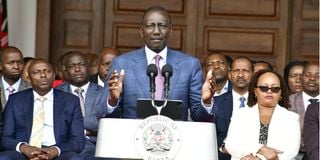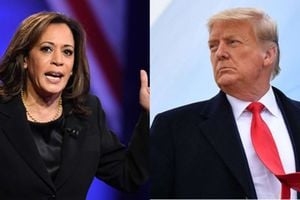
President William Ruto addresses the media at State House, Nairobi on June 26, 2024.
Intense, high-stakes crisis meetings between President William Ruto and his core teams of advisers as well as diplomats preceded the Head of State’s decision to send the Finance Bill, 2024 back to Parliament.
Multiple interviews with people who participated or had knowledge of the meetings revealed to Nation the frantic, night-long efforts to de-escalate tension in the country after protesters overran Parliament Buildings and vowed to march on to State House.
The President sought advisories on how to deal with the unfolding national crisis and pored over multiple simulations on scenarios that would arise from pushing ahead with the Bill, and what that would have meant for a regime that is hardly two years in power.
While moderates held the position that more pressure on the pedal was akin to the regime signing itself out of power, the hardliners stuck to their guns. To those fixated on use of brute force, climbing down was going to be a show of weakness that must never be associated with the Head of State.
The meetings were called before and way after the President’s address to the nation made shortly after 9pm.
While announcing his decision declining to assent to the Finance Bill, 2024, the President on Wednesday, June 26, alluded to the lengthy meetings when he said: “I have discussed with many stakeholders, I’ll be meeting some of them shortly after this, on charting a way forward and make sure that we carry the whole nation in this very important journey as we go into the future as a country.”
Voices of reason
Persons who attended the meetings described how the President was caught between two factions; the hardliners who saw the national crisis as a chance for the President to assert his authority by using security forces to suppress protesters and handle subsequent political consequences, and the voices of reason who provided counter-arguments that this was an opportune moment to display statesmanship and steer the country away from the tumultuous protests and intense atmosphere surrounding the Finance Bill ,2024.
The Nation has reliably established that the National Intelligence Service advised the President before and after the Tuesday protests to re-examine the Finance Bill and find ways of accommodating public concerns, “even if it meant temporarily suspending the process”.
The advice from NIS, however, did not find favour with hardliners within the Cabinet and senior members of his security and economic advisers.
“The President is truly in the horns of a dilemma, and consultations are still ongoing. With the voices of reason prevailing, there is hope that he will take a position that moves the country away from the path of the chaos, death and destruction witnessed on Tuesday,” said the sources.
Those opposed to dropping the Bill argued that it would be difficult to know where the youths would stop next time they are angered by a national issue.
A section of MPs had also separately reached out to the President, saying that they had already staked too much political capital for the government to retreat from pushing through the Finance Bill, 2024.
Intelligence shared with the President indicated that the violent protesters — separate from Gen Zs — had been ferried in buses from as far as Thika and Kiambu by senior politicians keen on introducing an ethnic angle to the chaos.
Powerful Western nations
According to sources who requested anonymity to speak freely, the President also received calls on Tuesday and Wednesday from diplomatic representatives of powerful Western nations and the Gulf States urging him to retreat from the hardline position and pursue a more conciliatory path.
In their public statements, the Embassies and High Commissions of the United Kingdom, Belgium, Canada, Denmark, Finland, Germany, Ireland, Netherlands, Norway, Estonia, Sweden, Romania, and the United States of America urged: “All actors have the responsibility to respect, uphold, promote, and fulfil the principles of democracy and the rule of law, particularly by ensuring a proportionate security response.”
“We welcome civic engagement by all Kenyans, in particular the youth, in addressing issues of vital public concern. We call for restraint on all sides and encourage all leaders to find peaceful solutions through constructive dialogue,” the joint statement said in part.
Separately, United Nations Secretary-General António Guterres said in a statement: “I am deeply saddened by the reports of deaths and injuries — including of journalists and medical personnel — connected to protests and street demonstrations in Kenya. I urge the Kenyan authorities to exercise restraint and call for all demonstrations to take place peacefully.” Presumably, the withdrawal of the Bill from Parliament is expected to allow for more consultations and is also expected to ease the political tension that has gripped the country over the past few days.
Social media
Public discourse for and against the Finance Bill continued on and off social media as the nation faced one of its most difficult moments. This was occasioned by tough economic times, including a huge national debt accumulated over the last decade.
Senior Counsel Ahmednasir Abdullahi, who supported President William Ruto’s election, pleaded with the President in a tweet to seek the conciliatory pathway and seek national consensus.
“The Finance Bill has left Parliament and is on the President’s desk. H.E @WILLIAMSRUTO SHOULD NOT ASSENT to the bill. He must send it back to Parliament. He must reduce the wasteful expenditure and cut government expenditure. He must also forgo the punitive taxes that define the Bill,” wrote Mr Abdullahi, adding: “Lastly, the President must listen to the national consensus that the Finance Bill is oppressive and cruel to all Kenyans. President Ruto, please give (a) concession. It will not show weakness. It will show leadership. Listening to the will of the people is true leadership.”
A similar tone was taken by Azimio adviser and law professor Makau Mutua, who supported Opposition leader Raila Odinga in the 2022 General Election.
“THREE things MUST happen to get Kenya out of this existential crisis. FIRST, the President must REJECT the bill as passed by the National Assembly. SECOND, Kenya Kwanza and Azimio MPs must come together and write a new Finance Bill taking into account the public’s key concerns,” wrote Prof Mutua, adding: “THIRD, the President needs to reconstitute his team of economic advisers. They are tone deaf and have brought Kenya to the brink of catastrophe and international shame. Lastly, I mourn the loss of life yesterday and wish all those who were injured a quick recovery. Let all be united for the love of country to get Kenya out of this crisis.”
The Constitution provides that at least two months before the end of each financial year, the Cabinet Secretary responsible for finance shall submit to the National Assembly estimates of the revenue and expenditure of the national government for the next financial year to be tabled in the National Assembly. This year, the process has been fraught with protests and memoranda for changes to reduce the economic burden that Kenyans are facing. Protesters have sustained #RejectFinanceBill2024 call despite several amendments introduced in Parliament.
The next course of action now lies with President Ruto and Parliament.
The President has committed to return the Bill to Parliament, presumably with a memorandum rejecting it.
Legal experts have told the Nation that the doctrine of continuity and legal principles support continuing existing tax laws whenever Parliament fails to pass a new Finance Act.
The President and his advisers face the central dilemma of youth unemployment. They must ward off a large number of youths from sinking into despondency and becoming a crime problem for the country, a problem that President Mwai Kibaki and President Uhuru Kenyatta previously confronted with mixed results.
Youth unemployment
President Kibaki initiated the Kazi Kwa Vijana programme, intending to address youth unemployment. Analysts say that while it provided some employment opportunities, challenges such as inadequate funding, corruption, and lack of sustainable projects hindered its impact. Many participants found short-term jobs, but the programme struggled to create lasting employment or skill development pathways for youth.
President Kenyatta initiated two youth employment programs during his tenure, including the Sh2.2 billion Empowering Novel Agribusiness-led Employment (ENABLE Kenya), which focused on capacity-building in agribusiness.
He also launched Generation Unlimited Kenya (GenU Kenya), which aligned with his Big 4 Agenda and aimed at streamlining education, training, and employment for young people. It focused on successful transitions from primary to secondary school, nurturing entrepreneurship, and promoting equitable access to employment opportunities.
President Ruto has launched the National Housing Programme, which is also intended to ensure youth unemployment, and is building a national digital superhighway to create opportunities for digital jobs.









